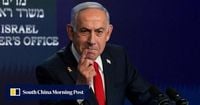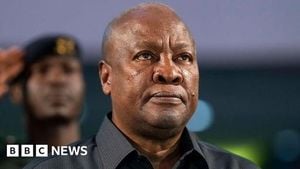Leaked audio recordings and recent political pronouncements have thrust Israel’s leadership into the global spotlight, sparking outrage, debate, and fresh anxiety across the Middle East. On August 15, 2025, Israel’s Channel 12 TV aired clandestine audio of former Maj. Gen. Aharon Haliva, the country’s ex-chief of military intelligence, making strikingly candid remarks about the human cost of Israel’s ongoing offensive in Gaza. Just days later, on August 19, Prime Minister Benjamin Netanyahu publicly embraced the controversial vision of a “Greater Israel,” further unsettling regional dynamics and drawing sharp rebukes from Arab leaders and international observers alike.
The audio leak, which Channel 12 broadcast to a stunned Israeli public, captured Haliva stating in Hebrew, “The fact that there are already 50,000 dead in Gaza is necessary and required for future generations.” He went on to assert that for every Israeli killed during Hamas’ surprise attack on October 7, 2023, “50 Palestinians should die.” Haliva’s words were unflinching—and, notably, he added, “It doesn’t matter if they’re children. I’m not speaking out of revenge. I’m talking about a message for future generations. From time to time, they need a Nakba to feel the cost.”
The term Nakba, or “catastrophe,” is laden with historical trauma for Palestinians, referencing the mass displacement of hundreds of thousands during the 1948 war that accompanied Israel’s creation. For many, hearing a former top Israeli commander invoke it so bluntly was a jarring escalation. According to Channel 12, it marked the first time a figure of Haliva’s rank within the military establishment has been heard openly endorsing such a high Palestinian death toll as “necessary” in Israel’s nearly two-year-long offensive in Gaza.
Haliva’s remarks come against the backdrop of the October 7, 2023, Hamas attack that killed nearly 1,200 Israelis and led to the kidnapping of more than 250, 50 of whom remain in captivity. The Palestinian health ministry in Gaza reports that over 60,000 Palestinians have been killed since the Israeli offensive began in response. The scale of devastation has prompted global condemnation, with some international legal bodies—such as the International Court of Justice—now examining whether Israel’s actions amount to genocide, a charge Israel vigorously denies.
In a sign of the broader reverberations, the Israeli human rights group B’Tselem posted on X that “the remarks by former head of Military Intelligence Aharon Haliva are part of a long line of official statements that expose a deliberate policy of genocide.” The rhetoric is not entirely new; Israeli politicians have previously made incendiary statements about “erasing” Gaza and fighting “human animals,” language that has been cited in international legal proceedings. However, Haliva’s comments, given his seniority and direct military involvement, have added a new layer of gravity to the ongoing debate.
Haliva, who oversaw Israeli military intelligence during what is now acknowledged as the country’s greatest intelligence failure, resigned in April 2024. He took responsibility for the lapses that enabled the Hamas assault and the mass kidnappings. In other remarks aired by Channel 12, Haliva admitted that Israeli intelligence had long underestimated the threat from Gaza, operating under the assumption that Hamas was deterred from launching a full-scale war. “For years, military assessments concluded that Hamas was deterred from launching a full-scale war—and that the greater danger of attack came from the West Bank, not Gaza,” he reflected. That belief collapsed in the face of the October 7 attacks, which exposed deep vulnerabilities in Israel’s defenses.
Following the broadcast of his remarks, Haliva confirmed the authenticity of the leaked audio and expressed regret, stating that the quotes were taken out of context. Still, the damage was done: his words circulated rapidly, fueling anger and debate both inside Israel and far beyond its borders.
If Haliva’s leaked comments poured gasoline on an already raging fire, Prime Minister Benjamin Netanyahu’s statements days later threatened to ignite a regional inferno. On August 19, 2025, Netanyahu declared in a televised interview that he is on a “historic and spiritual mission” intimately connected to the expansionist vision of “Greater Israel.”
The idea of Greater Israel has long circulated among the Israeli far-right, though its precise boundaries are the subject of fierce debate. All versions involve the annexation of Palestinian territories and the seizure of land from neighboring states—Egypt, Jordan, Lebanon, and Syria. Some of the more extreme interpretations even extend to parts of Iraq, Kuwait, Saudi Arabia, and Turkey. During the interview, Netanyahu accepted a symbolic amulet from Sharon Gal, a former right-wing Knesset member, reportedly engraved with one of the more expansive maps of Greater Israel. The gesture was not lost on the region’s leaders or its people.
Reaction was swift and severe. Netanyahu’s expansionist rhetoric “has shaken the Arab world,” according to South China Morning Post. A former top adviser to the United Arab Emirates called Netanyahu “no less dangerous than Hitler,” underscoring the depth of alarm in Arab capitals. Saudi Arabia’s foreign ministry, for its part, issued a strong condemnation in response to Netanyahu’s remarks, posting its reaction on social media and warning of the destabilizing consequences such rhetoric could have for the entire region.
The convergence of Haliva’s leaked remarks and Netanyahu’s public embrace of Greater Israel has left many observers deeply unsettled. For Palestinians, the invocation of Nakba and the open discussion of massive casualties are chilling reminders of past traumas and ongoing fears. For Israel’s allies and adversaries alike, Netanyahu’s expansionist language raises questions about the country’s future direction and its willingness to abide by international norms and agreements.
Yet, the story is not one-dimensional. Within Israel, there is a spectrum of opinion: some see Netanyahu’s vision as a bold assertion of national destiny, while others fear it risks turning Israel into, as one commentator put it, “a rogue, destabilising state”—drawing unflattering comparisons to Iran’s pariah status in the region. The debate is fierce, and the stakes could hardly be higher.
As the world watches, the intersection of military candor and political ambition in Israel is setting off shockwaves far beyond its borders. The coming months will reveal whether these words are harbingers of a new regional order—or warnings of dangers yet to come.




